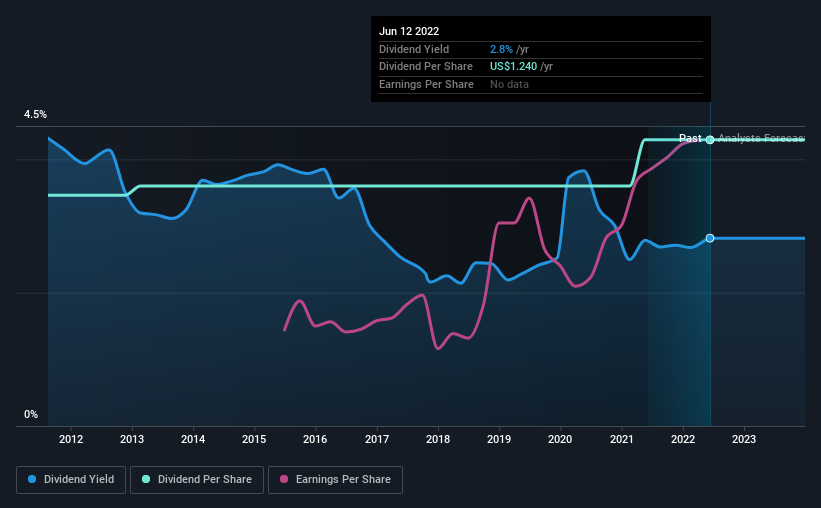Be Sure To Check Out Chemung Financial Corporation (NASDAQ:CHMG) Before It Goes Ex-Dividend
Readers hoping to buy Chemung Financial Corporation (NASDAQ:CHMG) for its dividend will need to make their move shortly, as the stock is about to trade ex-dividend. Typically, the ex-dividend date is one business day before the record date which is the date on which a company determines the shareholders eligible to receive a dividend. The ex-dividend date is of consequence because whenever a stock is bought or sold, the trade takes at least two business day to settle. Therefore, if you purchase Chemung Financial's shares on or after the 16th of June, you won't be eligible to receive the dividend, when it is paid on the 1st of July.
The company's upcoming dividend is US$0.31 a share, following on from the last 12 months, when the company distributed a total of US$1.24 per share to shareholders. Based on the last year's worth of payments, Chemung Financial has a trailing yield of 2.8% on the current stock price of $44.01. We love seeing companies pay a dividend, but it's also important to be sure that laying the golden eggs isn't going to kill our golden goose! We need to see whether the dividend is covered by earnings and if it's growing.
Check out our latest analysis for Chemung Financial
Dividends are typically paid out of company income, so if a company pays out more than it earned, its dividend is usually at a higher risk of being cut. Chemung Financial has a low and conservative payout ratio of just 22% of its income after tax.
Companies that pay out less in dividends than they earn in profits generally have more sustainable dividends. The lower the payout ratio, the more wiggle room the business has before it could be forced to cut the dividend.
Click here to see the company's payout ratio, plus analyst estimates of its future dividends.
Have Earnings And Dividends Been Growing?
Stocks in companies that generate sustainable earnings growth often make the best dividend prospects, as it is easier to lift the dividend when earnings are rising. If earnings decline and the company is forced to cut its dividend, investors could watch the value of their investment go up in smoke. It's encouraging to see Chemung Financial has grown its earnings rapidly, up 22% a year for the past five years.
Many investors will assess a company's dividend performance by evaluating how much the dividend payments have changed over time. Chemung Financial has delivered an average of 2.2% per year annual increase in its dividend, based on the past 10 years of dividend payments. Earnings per share have been growing much quicker than dividends, potentially because Chemung Financial is keeping back more of its profits to grow the business.
The Bottom Line
From a dividend perspective, should investors buy or avoid Chemung Financial? When companies are growing rapidly and retaining a majority of the profits within the business, it's usually a sign that reinvesting earnings creates more value than paying dividends to shareholders. This strategy can add significant value to shareholders over the long term - as long as it's done without issuing too many new shares. Chemung Financial ticks a lot of boxes for us from a dividend perspective, and we think these characteristics should mark the company as deserving of further attention.
With that in mind, a critical part of thorough stock research is being aware of any risks that stock currently faces. Be aware that Chemung Financial is showing 2 warning signs in our investment analysis, and 1 of those is significant...
If you're in the market for strong dividend payers, we recommend checking our selection of top dividend stocks.
Have feedback on this article? Concerned about the content? Get in touch with us directly. Alternatively, email editorial-team (at) simplywallst.com.
This article by Simply Wall St is general in nature. We provide commentary based on historical data and analyst forecasts only using an unbiased methodology and our articles are not intended to be financial advice. It does not constitute a recommendation to buy or sell any stock, and does not take account of your objectives, or your financial situation. We aim to bring you long-term focused analysis driven by fundamental data. Note that our analysis may not factor in the latest price-sensitive company announcements or qualitative material. Simply Wall St has no position in any stocks mentioned.

